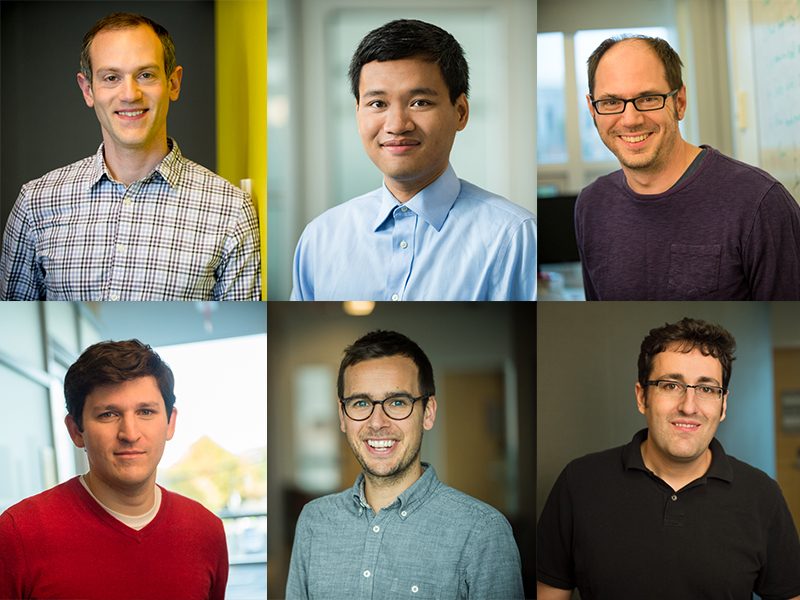Khoury News
CCIS Junior Faculty Research Recognized with Six NSF CAREER Awards
The National Science Foundation (NSF) CAREER award program offers, “prestigious awards in support of early-career faculty who have the potential to serve as academic role models in research and education […]

The National Science Foundation (NSF) CAREER award program offers, “prestigious awards in support of early-career faculty who have the potential to serve as academic role models in research and education and to lead advances in the mission of their department or organization.” This year, six College of Computer and Information Science (CCIS) faculty members had the honor of receiving NSF CAREER awards for their outstanding research proposals in areas ranging from cryptography and machine learning to data privacy and security. The junior-faculty members who received the awards include Assistant Professors David Choffnes, Huy Nguyen, Robert Platt, Jonathan Ullman, Byron Wallace and Daniel Wichs.
The CAREER proposals each faculty member submitted are incredibly unique, building off each individual’s prior research in order to move forward in new, unexplored directions.
Choffnes’ research has been grounded in, “understanding when, how and why things go wrong, and how we can design future networked systems to address these problems,” he said. His research has focused on topics such as the privacy of mobile and IoT devices and his CAREER proposal exemplifies that, looking to address data privacy through Personal Virtual Networks (PVNs) – using software that, “checks for (and blocks) privacy leaks, thwarts attempts to compromise users’ secure connections with websites, and ensures that the network provider does not arbitrarily slow down or speed up certain applications,” Choffnes said.
The underlying challenge in many technical problems, according to Nguyen, is the need for suitable representation of data that facilitates the efficient computation, storage and communication of the data itself. His CAREER proposal looks to focus on these underlying challenges in order to apply specific solutions to some of the main problems involved in the processing of massive data sets, which are “finding frequent items in data streams and constrained optimization in distributed settings.”
According to Ullman, Apple, Google and the United States Census Bureau –are all examples of organizations that can collect and analyze data for interesting patterns, while potentially putting the privacy of the data owners on the line. Ullman’s research in the way data collection can compromise privacy has served the basis for his CAREER proposal, which seeks to, “ensure reproducibility of scientific studies even when datasets are reused multiple times.” For example, privacy tools “that are usually seen as a hindrance to using data effectively” are instead used “as a tool to help use data effectively,” Ullman said.
Wallace’s CAREER award will support his work in machine learning, specifically, constructing machine learning models that have the ability to, “read and synthesize scientific evidence published in journal articles,” he said. This work draws off similar work Wallace conducted for his thesis, which “concerned building models to automatically identify evidence relevant to particular clinical questions.”
Finally, Wichs, who is also the recipient of a prestigious 2018 Sloan Research Fellowship, is using his CAREER award to focus on cryptography research. Historically, Wichs’ research has focused on data security and how to effectively utilize data while also maintaining its protection. “This is especially important for data stored remotely in the cloud, where users want to keep the data protected but still want the cloud to offer various functionality over the outsourced data,” he said. His continued research seeks to build “cryptographic schemes” that allow individuals to perform computations over encrypted data while the data itself remains secure and unknown to the individual analyzing it.
Research on this scale requires true dedication and commitment. The junior faculty members realize this and reiterate it in their advice to current, former and prospective students.
“This comes by way of John Mitchell, a professor at Stanford, but it’s great advice; ‘Researcher’ is the only job in the world where the job description is to study whatever you want—if you’re not studying what you want to be studying, you’re not doing your job,” said Ullman. “I’m not as insightful as John, but my advice is to always keep the big picture of your research in mind and don’t get lost in the day to day.”
Professor Wichs explained that cryptography is an exciting field with a multitude of recent progress, but researchers have barely scratched the surface – there is much left to do. “If you’re looking for a research area that combines beautiful mathematical concepts with important applications, I can’t think of a better subject to get into,” Wichs said.
The junior faculty members each hope to contribute to additional, groundbreaking research in their respective areas of expertise thanks to the opportunities made possible by their NSF CAREER awards.
(Starting from top left, clockwise: David Choffnes, Huy Nguyen, Robert Platt, Daniel Wichs, Byron Wallace, Jonathan Ullman)